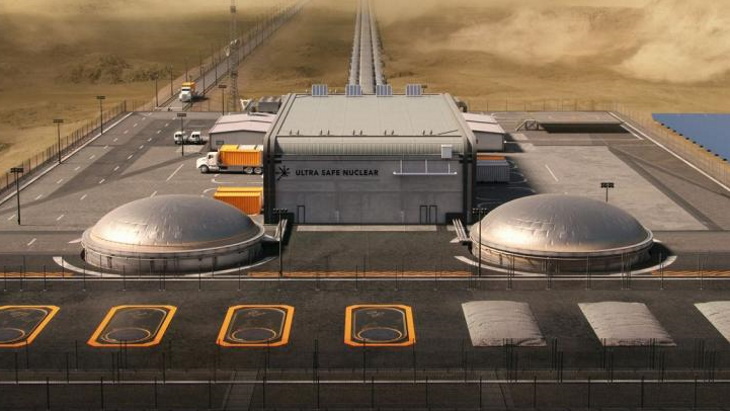Fuel flexibility gives MMR range of power outputs
Ultra Safe Nuclear Corporation (USNC) announced that a technology breakthrough in its patented Fully Ceramic Microencapsulated (FCM) fuel allows a fuel geometry that results in both higher power and increased safety, enabling its Micro-Modular Reactor (MMR) to produce three times more power.

A rendering of an MMR power plant (Image: USNC)
The MMR has previously been touted as a 15 MW thermal, 5 MW electrical high-temperature gas-cooled reactor, using TRISO (tristructural isotropic) fuel in prismatic graphite blocks and with a sealed, transportable core. The graphite blocks contain stacks of FCM fuel pellets. The helium-cooled reactor is fuelled once for its 20-year lifetime.
The company has now said the MMR can flexibly work with either high-assay low-enriched uranium (HALEU) fuel (with 19.75% enrichment) or low-enriched uranium (LEU) fuel (with 9.9% enrichment) and operate at various power levels from 10 MWt (3.3 MWe) to 45 MWt (15 MWe). This, USNC said, enables it to serve a range of customers with a single standardised design.
"To accomplish this update, USNC is successfully demonstrating breakthrough technologies in 3-D printing and advanced manufacturing of its patented FCM fuel," the company said. "These technologies allow the flexibility to produce unique geometry FCM fuel pellets. FCM further encases TRISO particles in silicon carbide, ensuring that the helium coolant remains free from contamination. This advancement reduces thermal stresses on the fuel and enables increases in the output temperature and power of the MMR."
USNC said that following discussions with a range of customers and investors, it sought "innovation around a versatile design that better serves higher heat and power demands while still serving remote application customers".
"Making these important changes now brings focus to USNC resources and ensures our demonstrations will be the same design as our commercial deployments, increasing their relevance," said USNC Chief Nuclear Officer Dan Stout. "It is worth some near-term schedule impact for the flexibility and a 300% power uprate."
The company is currently working on deployment projects at Canadian Nuclear Laboratories' Chalk River site in Ontario, Canada, and at the University of Illinois Urbana-Champaign in the USA.
Researched and written by World Nuclear News
- China Institute of Atomic Energy
- Nuclear Power Institute of China
- Southwestern Institute of Physics
- China Nuclear Power Operation Technology Corporation, Ltd.
- China Nuclear Power Engineering Co., Ltd.
- China Institute for Radiation Protection
- Beijing Research Institute of Uranium Geology (BRIUG)
- China Institute of Nuclear Industry Strategy (CINIS)
- China Nuclear Mining Science and Technology Corporation


